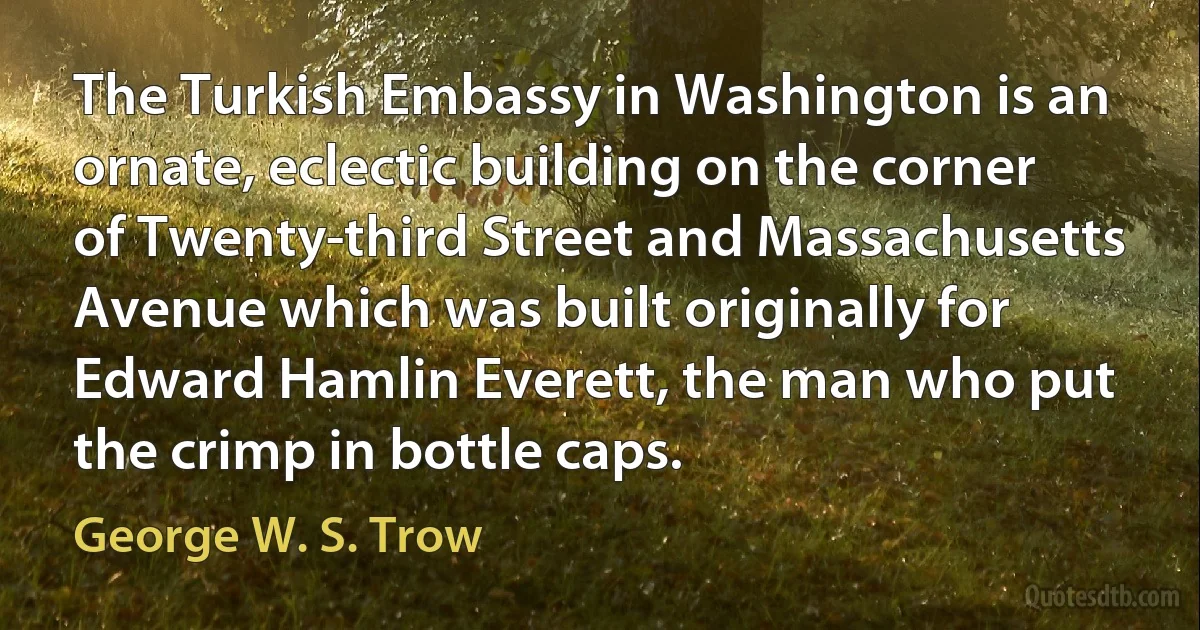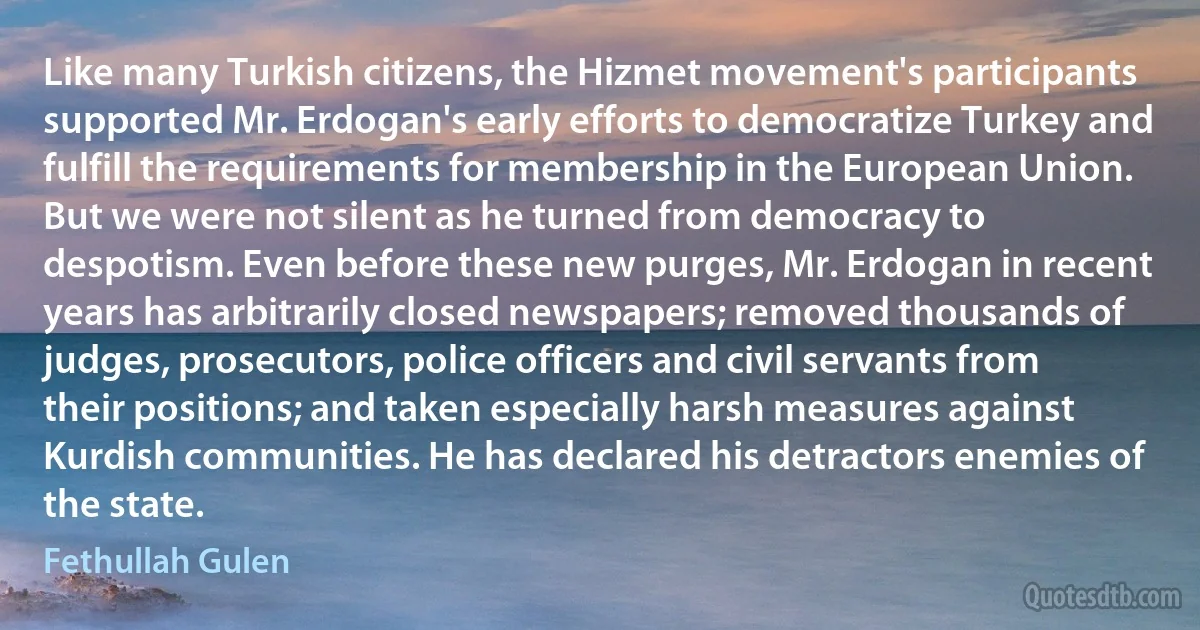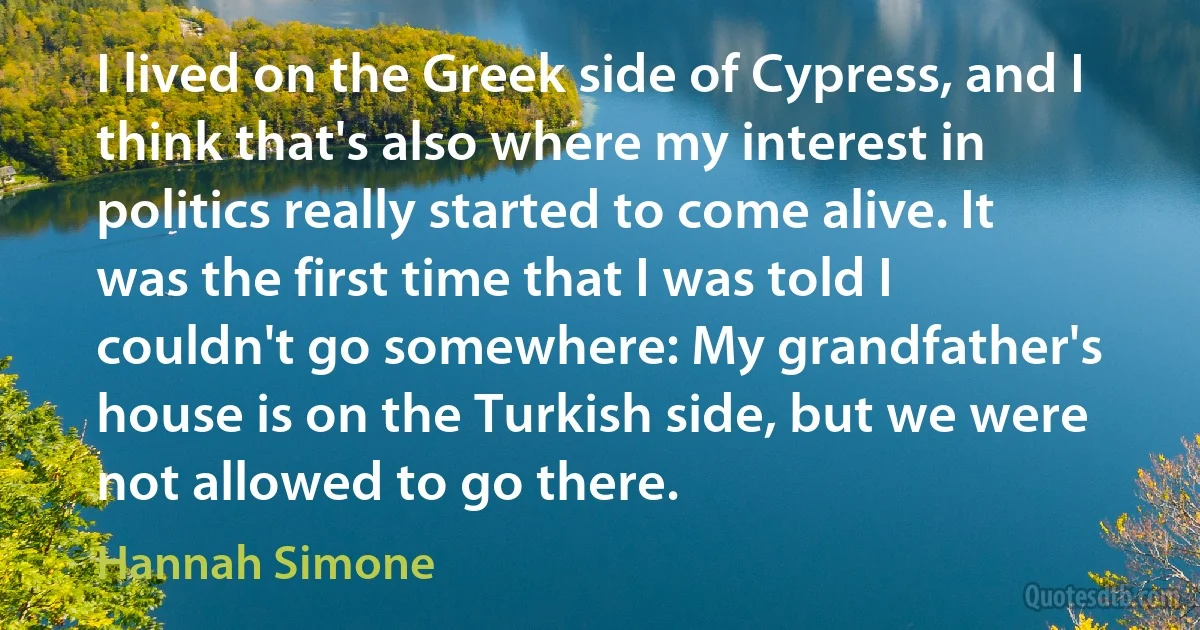Turkish Quotes - page 3
It is now necessary to face the truth and to acknowledge against all prejudices that the struggle that the Albanian tribe is leading today is a natural and unavoidable historic struggle for a different political life than that experienced under Turkish rule - different also from that which its neighbours Serbia, Greece and Montenegro would like to force upon the Albanians.

Dimitrije Tucović
Thus, almost everything is imitation. The idea of The Persian Letters was taken from The Turkish Spy. Boiardo imitated Pulci, Ariosto imitated Boiardo. The most original minds borrowed from one another. Miguel de Cervantes makes his Don Quixote a fool; but pray is Orlando any other? It would puzzle one to decide whether knight errantry has been made more ridiculous by the grotesque painting of Cervantes, than by the luxuriant imagination of Ariosto. Metastasio has taken the greatest part of his operas from our French tragedies. Several English writers have copied us without saying one word of the matter. It is with books as with the fire in our hearths; we go to a neighbor to get the embers and light it when we return home, pass it on to others, and it belongs to everyone.

Voltaire
My grandfather, a teacher of religion, could think of nothing better than to place my father – his eldest son, still a child – as a clerk with a firm of herring wholesalers, and his youngest son with a barber. No, my father was not a clerk, but, for thirty-two years, a plain workman [in the Jewish ghetto of Vitebsk ]. He lifted heavy barrels, and my heart used to twist like a Turkish pretzel as I watched him carrying those loads and stirring the little herrings with his frozen hands.. .Sometimes my father's clothes would glisten with herring brine. The light played above him, besides him. But his face, now yellow, now clear, would sometimes break into a wan smile.

Marc Chagall
News of the atrocities, which have recently been perpetrated by the Turkish king in Constantinople and have now been divulged, has so inflamed a man [Cusa himself] who once saw that region, with zeal for God, that amongst many sighs he asked the Creator of all things if in His kindness He might moderate the persecution, which raged more than usual on account of diverse religious rites. Then it occurred that after several days-indeed on account of lengthy, continuous meditation-a vision was manifested to the zealous man, from which he concluded that it would be possible, through the experience of a few wise men who are well acquainted with all the diverse practices which are observed in religions across the world, to find a unique and propitious concordance, and through this to constitute a perpetual peace in religion upon the appropriate and true course.

Nicholas of Cusa
"Culture" is a new phenomenon, I believe. Culture is the new religion. People treat you based upon your culture. You are pushed to describe yourself by your culture: Kurdish or Turkish? Left wing or right wing? Progressive or conservative? Westerner or Easterner? European or Asian? So we have a label ready for you.

Burhan Sonmez
We are accustomed to talking of church and state, and a whole series of pairs of words that go with them lay and ecclesiastical, secular and religious, spiritual and temporal, and so on. These pairs of words simply do not exist in classical Islamic terminology, because the dichotomy that these words express is unknown. They are used in the modern languages. In Arabic, they borrow the terminology used by Christian Arabs. They are fortunate in having a substantial Christian population using Arabic, and they therefore have a good part of the modern terminology at their disposal, in their own language. In Turkish, Persian, Urdu and other languages of Islam, they had to invent new words.

Bernard Lewis
The right to free expression and assembly has been cast aside, and the number of ordinary people incarcerated is growing by the day. The Turkish government led by Recep Tayyip Erdogan's Justice and Development Party, known as the A. K. P., has turned its back on universal democratic values and pushed the country to the brink of political and economic crisis.

Selahattin Demirtaş
[What worried him most was that the Indian Muslims were appointed to] "high offices and are successful in their work... they will make people of their own kind their helpers, supporters, colleagues. They will not allow (Turkish) nobles and free-born men and men of merits to come anywhere near the affairs of the government.”.

Ziauddin Barani
The following anecdote is related of Sultan Shamsuddin Iltutmish. He was greatly enamoured of a Turkish slave girl in his harem, whom he had purchased, and sought her caresses, but was always unable to achieve his object. One day he was seated, having his head anointed with some perfumed oil by the hands of the same slave girl, when he felt some tears fall on his head. On looking up, he found that she was weeping. He inquired of her the cause. She replied, "Once I had a brother who had such a bald place on his head as you have, and it reminds me of him.” On making further inquiries it was found that the slave girl was his own sister. They had both been sold as slaves, in their early childhood, by their half-brothers; and thus had Almighty God saved him from committing a great sin. Badaoni states in his work, "I heard this story myself, from the emperor Akbar's own lips, and the monarch stated that this anecdote had been orally traced to Sultan Ghiyasuddin Balban himself.”.

Iltutmish
The Armenian Genocide is such a controversial and very sensitive issue because the Turkish and Armenian people disagree about the facts of what actually happened. I know how strongly Armenians feel about the Genocide, and how it's never been recognised. At the same time, I do not hold today's generation of people accountable.

Khloe Kardashian
Maybe in June or July, I looked in the mirror. I'm like, ‘Man, I see a fat man. Look at that man, I feel fat.' Not just feel fat, just look fat, too. I needed like a bra or something. I kept eating all this Turkish food. I was like, I need to stop doing it. I need to just - the season is coming. It's a really important season for us. I need to be in shape.

Enes Kanter
When Turkey buys Iranian oil, we pay for it in Turkish lira... However, it is not possible for Iran to take that money as dollars into its own country due to international restrictions, the U.S.A.s sanctions. Therefore, when Iran cannot take this money back as currency, they withdraw Turkish lira and buy gold from our market.

Ali Babacan
Voulagris asked me to find film funding for what was to be the last but unfinished film project of Elia Kazan, a personal friend of Voulgaris. The subject of the film was the immigration of the Kazan family from the beleaguered Greek minority communities under Turkish rule in Asia Minor to the safe haven of the USA where the Kazan family settled. I arranged a meeting between Elia Kazan and the London based film financier Frixos Constantini of Poseidon Films at the Grand Bretagne Hotel in Athens. What followed from this meeting is that Mr Constantini put Elia Kazan in touch with Martin Scorsese a personal friend of Mr Constantini and who also runs the production company Cappa films. And so it was that these two giants of US cinema met for the first time.

Angelique Rockas



